 |
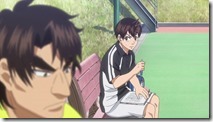 |
 |
Dear Maruo:
I feel your pain.
A hearty congratulations to Stan Wawrinka, who once again stunned the Number 1 player in the world to win a major. This time around there were no health issues – Novak Djokovic was healthy and seemingly at the top of his game, and Stan was simply better. Wawrinka seems like a hell of a guy, but I confess I was rooting for Novak, because of the possibility of having two players trying to win the grand slam this year. But there can be no doubt the right guy won – as he did with Roger Federer in the quarters, Stan simply hit Novak off the court. Let that be a lesson about the “weak half” of the draw.
The guy Novak hit off the court in the quarters, Rafa Nadal, is very much a presence in this week’s Baby Steps. His stamp is all over Araya’s game – that topspin lefty forehand with the helicopter finish, that wide slice serve in the ad-court, that worn-on-the-sleeve emotion. Araya is, in short, a very tough nut to crack – an attacking baseliner (certainly the favored template for the modern all-court player) with a big serve and an intimidating court presence. If he was the one getting time warnings from the chair instead of Maruo-kun, he’d be almost a dead-ringer.
There are definitely times in Baby Steps when the speed of Ei-chan’s progression is a major factor, and this match is one of them. It usually takes his repeat opponents by surprise (it certainly did here), and often Ei-chan himself, too. But it’s a double-edged sword, because no matter who you are, there are going to be times when there’s simply no substitute for experience, because some things in sports simply can’t be emulated in practice or the classroom. And for someone like Ei-chan who relies so heavily on his observational skills – and applying his analytical skills to what he observes – this is perhaps an even larger factor.
In case you’ve never played, it’s true – being left-handed is in itself an advantage in tennis, and that’s why a disproportionate number of the greats have been lefties. Some of the factors are highlighted beautifully here through Ei-chan’s perspective, starting with the most obvious – you simply don’t face lefties as often as righties. The ball acts differently coming at you. But there’s also subtler stuff, like the fact that the lefty serve out-wide happens in the ad-court, which means you have to deal with it on every ad-point when you’re trying to break serve. Trust me – facing southpaws is a pain in the ass.
What we have, then, is a situation exactly as Aoi-kantoku sums it up. When these two played the first time, the skill gap was so wide that the lefty factor really didn’t matter – Araya was going to win no matter what. Now Maruo knows enough to understand that something is off when facing Araya, and even though he’s able to put his razor-trap mind around the cause quickly, he lacks the experience to come up with a solution. Simply reacting to Araya’s shots as mirror-images of “normal” strokes isn’t going to work. In a sense, you could look at the lefty forehand as a similar problem hitters face when dealing with a pitcher who “hides the ball” like Eijun in Diamond no Ace – it gets on top of you faster than your body expects it to. And as for that wide serve, well… When you figure out how to solve that be sure to let the world know, because no one has yet.
Ah, Ei-chan… It feels like watching all those Federer-Nadal matches on clay all over again. Except of course Ei-chan is forced to improvize here because he’s as green as a fresh-pickled toad. And here he learns a hard lesson about what he experienced in playing Nat-chan – instinct works much better when it has experience to build on. This is where his grinder skills come in, because that’s exactly what he does – grind on what he knows and what he can guess, and try and figure out some way to stop the bleeding. His backhand has gone off the rails as a result of mis-timing a barrage of crosscourt forehands, and Araya is a much more cool and level-headed foe than he was a year earlier – he focuses on the weaknesses he sees relentlessly in winning the first set.
This is what learning a sport is all about – being forced by circumstances to grow into something greater than you were before. Against a player with greater skill, physical strength and speed, and much more experience what does one do to try and turn the tide? The answer will come in due course and we’ll talk about it when the time comes, but it’s for these moments that every Baby Steps fan really waits – they’re when the series really seems to be operating on all cylinders and fully realizing its potential.
 |
 |
 |
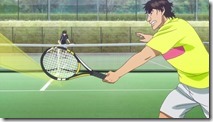 |
 |
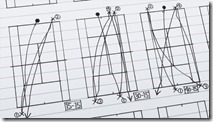 |
 |
 |
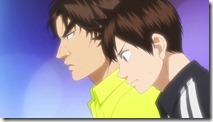 |
 |
 |
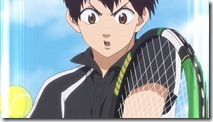 |
 |
 |
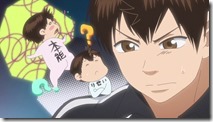 |
 |
 |
 |
 |
 |
 |


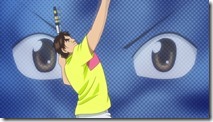
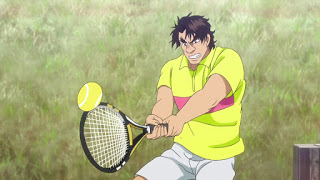
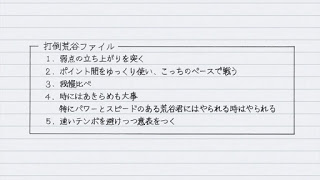
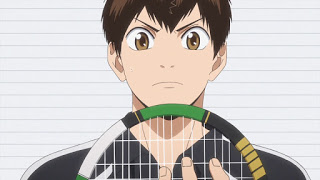
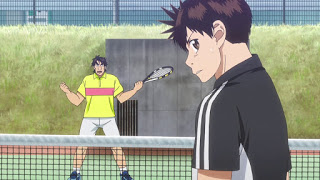
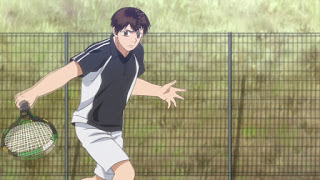
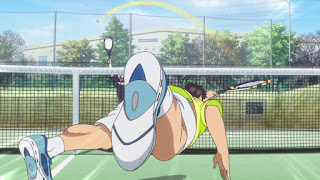
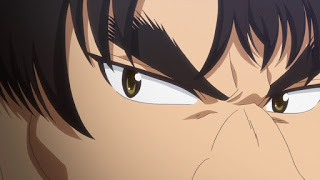

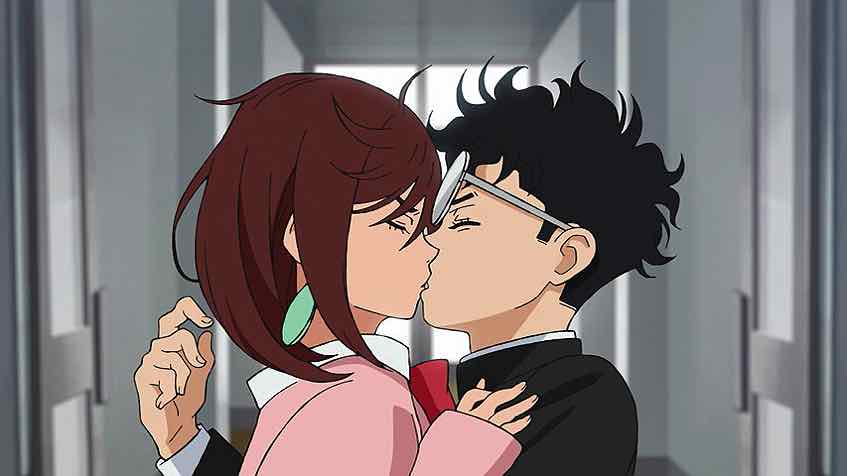
Jay Psi
June 8, 2015 at 9:27 amLet's have a word for the 8th Wonder of the World, Warwinka's backhand.
Extraordinary.
It's hard not to draw comparisons to Del Potro's 2009 US Open win (when Federer was also as good as he could be but JMdP just hit him out of the stadium), so I hope Stan's relatively late blooming doesn't count against him too much. Roll on Wimbledon.
As for this episode, as a southpaw (boxing though, so not as pronounced an advantage) I had a chuckle to myself more than once. The point about not being able to rely on instinct when there is no reasoning to back it up was a vital one and it was typically well put – you just feel at a loss and without taking a step back it's very easy to fall off your game completely.
admin
June 8, 2015 at 4:31 pmI never boxed, though I have heard a lot of trainers and fighters who sound like they disagree with you about the advantage not being as pronounced.
The third about del Potro, though, is that unlike Stan he'd never won a slam before. So I think that match was an even bigger shocker.
Nadavu
June 8, 2015 at 10:49 amHow could Ei-chan possibly not have noticed that Arata is left handed..? even someone who knows nothing about tennis (like myself) and has poor eye sight can see, at the very least, that he's hitting serves with his left hand.
Couch Tomato
June 8, 2015 at 1:42 pmI don't think it's that he didn't notice, it's just that he didn't really appreciate the significance of how it makes things different because he was still learning a lot at that point.
admin
June 8, 2015 at 4:29 pmWhat Tomato said. He lacked the tennis experience to understand why Araya being left-handed was important.
Mark
June 9, 2015 at 7:08 amI just finished this episode and had a random thought. Maruo's parents are never shown at a game. It's weird because they're obviously rather supportive and their kid is in the (prefecture?) finals.
admin
June 9, 2015 at 3:54 pmI can't discuss that for obvious reasons, but I'll just say it's not a question of an oversight in the writing. Stick with it.